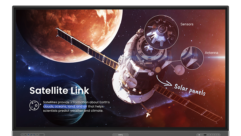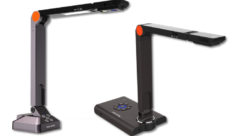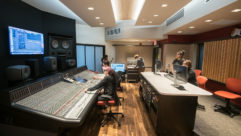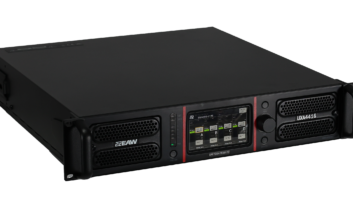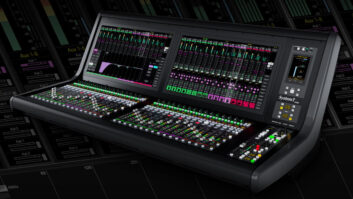Educating the Educators
Oct 18, 2006 8:23 PM,
By Linda Seid Frembes
A quick glance at the incoming mail pile indicates that tradeshow season is here. Every spring and fall (and even summer and winter nowadays), an avalanche of tradeshow and conference brochures tout their expertise in a particular market segment. A welcome change has been the increased emphasis on the education market; in particular, several shows that are capturing the attention of K-12 and higher-education educators interested in furthering their AV knowledge.
The focus on AV in education is not a surprise to some, given the recent research findings of InfoComm International. According to the association’s 2006 “AV in Higher Education” survey:
- Five years from now, half of all classrooms in the higher-education setting will have AV technology.
- Instructional classroom technology and distance learning are the two main drivers of AV systems in higher education. As a result, the AV products that are most commonly purchased are projectors, control systems, and audio- and videoconferencing equipment.
- Just 15 percent of the total student population in the United States are traditional students. The remaining 85 percent are working adults and part-time students, many of whom rely on technology for distance learning and portable technology.
Founded three years ago, the annual EduComm conference is produced by magazine and online publisher Professional Media Group (PMG) and is co-located with InfoComm each June. According to Dan Kinnaman, president of PMG, the show has experienced 60 percent year-over-year growth, with 73 percent of the surveyed 2006 attendees indicating they would likely return next year.
As a former technology director for a school system, Kinnaman understands the challenge of searching for low-cost, quality AV systems for the classroom. “At the time, classrooms were filled with computers, so the next step was a presentation system,” he notes. “It was difficult to find a comprehensive resource for information to make a wise buying decision. EduComm’s goal is to help educators make better buying decisions.”
Mirroring the paradigm shifts occurring in the mainstream AV world, the show’s main focus is on the convergence of AV and IT, with coverage of topics such as asset management and IP networks. EduComm also serves a gathering place for educators to learn what other educators are facing and to discuss trends and commonalities. “EduComm attendees get the added benefit of visiting the InfoComm show floor, where you can see and experience the products that you just heard about from your colleagues,” Kinnaman explains. “Sure, an educator could try and go it alone—show up on a tradeshow floor and try to figure out the many different markets and applications addressed there. A better alternative is EduComm, which brings cohesiveness to the needs and challenges of the K-12 and higher-education markets.”
At the 2006 show, the EduComm pavilion, sponsored by Dell, Sonic Foundry, Smart Technologies, and Extron, featured four concepts with the theme of “Tomorrow’s Classroom Today.” These hands-on classroom models gave attendees the opportunity to gather and experience the possibility of AV in a real-world setting. The pavilion was meant to enhance what was learned at the education sessions, run by educators for educators. “We encourage schools to send a team of people to the show since there is so much offered. Our focus is on the upper management level and helping them to evaluate new technology,” Kinnaman adds.
The 4th annual EduComm Conference will be held in Anaheim, Calif., from June 19, 2007, to June 21, 2007.
Specifically targeted to the higher education market, the Educause annual conference and exhibit is produced by a nonprofit association of the same name whose mission is to advance higher education by promoting the intelligent use of information technology (IT). The current association was created 10 years ago when two associations merged under the Educause name.
According to Diana Oblinger, vice president of Educause, the show’s main attendees usually have some type of IT responsibility, but the audience demographic is growing in broad strokes. “We use the motto, ‘It is not just about IT; it’s through IT,’ to explain our mission,” says Oblinger. “Our conference addresses technical issues from how to record a podcast up to future technologies like building a cyber infrastructure but also issues that occur through the use of IT like policy implications for certain web services like MySpace.”
The conference sessions are designed to address the top IT issues in higher education, with some that have overlapping AV influences like presentation technology, network infrastructure and equipment, e-learning or distance learning, and strategic planning. “The amount of international participation has increased. Attendees are finding similarities between higher-education facilities in other countries,” Oblinger says. “We work to improve the profession of IT through professional development using tools like leadership institutes, which translates well all over the globe.”
Oblinger also noted that attendees are not just IT professionals but others such as attorneys who wish to learn more about policy issues in IT, as well as facility managers who wish to learn more about classroom design. Educause 2006 recently occurred from Oct. 9 to Oct. 12, 2006 in Dallas. Educause 2007 will occur from Oct. 23 to Oct. 26, 2007 in Seattle.
Geared toward pre-K-12 education, the National Educational Computing Conference (NECC) conference is presented by the nonprofit group International Society for Technology in Education (ISTE). ISTE focuses on education technology and provides leadership and service to improve teaching and learning by advancing the use of technology in PK-12 and teacher education. NECC attendees include teachers, administrators, library media specialists, technology coordinators, and teacher educators, as well as representatives from industry and government.
Billing itself as the largest educational technology event in the world, NECC 2006 included 1,248 booths and nearly 500 companies displaying hardware, software, educational and technical publishing, and equipment/services emphasizing the use of computers by students and education professionals. NECC conference subjects during the 2006 show ranged from wireless networking to online learning, electronic learning products, professional development programs, and interactive video projects. NECC 2007 will take place June 24 to June 27, 2007 in Atlanta.




